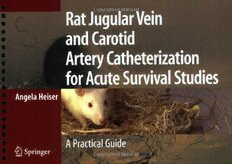
Rat Jugular Vain and Carotid Artery Catheterization for Acute Survival Studies: A Practical Guide PDF
123 Pages·2007·6.394 MB·English
Most books are stored in the elastic cloud where traffic is expensive. For this reason, we have a limit on daily download.
Preview Rat Jugular Vain and Carotid Artery Catheterization for Acute Survival Studies: A Practical Guide
Description:
Jugular vein and carotid artery cannulations are among the most widely used surgeries in research labs around the world. These cannulations are extremely important for confirmed intravenous delivery of test substances and arterial blood collection. Cannulation reduces the stress of multiple sampling as observed in association with tail vein or orbital sinus techniques (Ling, 2003; Flynn, 1988; Cocchetto, 1983). Very few adverse effects, including a possible rise of corticosterones and a decrease in platelets, are associated with indwelling catheters except under chronic conditions (Fagin, 1983; Richman, 1980). Typically, technicians teach these skills to incoming employees and move on to graduate studies or other fields. A resulting "oral history" of cannulation has been passed down from technician to technician. I have endeavored to capture these techniques on paper. Through the years, I have searched for and collected a number of training materials and guides for teaching purposes. This is my attempt to compile all the necessary information in one source. The contents of this manual include two cannulation procedures detailed in a format of materials, instruction, and pictorial for each step. In addition, the manual is rounded out with information regarding procedures for anesthesia, pre- and post- operatives, anatomy, bleeding techniques using catheters implanted, and rat biodata compiled from numerous sources. The content is thoroughly researched and reported based on over 80 references and 7 reviewers’ suggestions.
See more
The list of books you might like
Most books are stored in the elastic cloud where traffic is expensive. For this reason, we have a limit on daily download.
